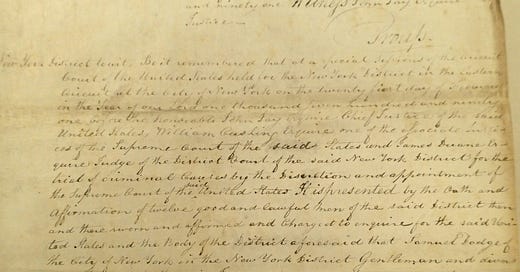…in 1789, President George Washington signed
the nation’s first Judiciary Act (there would be others!). The Judiciary Act not only established the nation’s federal court system but it’s 35th section created new two federal positions. The first was the Attorney General. The second was the United States Attorney. Both positions identified only two requirements: (1) be a “meet person” and (2) learned in the law. They would fulfill different functions, however. The Attorney General would represent the United States in the Supreme Court and provide advice to cabinet officials. The United States Attorneys would represent the United States in the district and circuit courts.
When Washington signed the legislation, he could not have predicted that these positions would eventually have “more control over life, liberty, and reputation than any other person in America.” (Robert Jackson, The Federal Prosecutor, 1941)
Today, federal prosecutors appear regularly on the nightly news. Yet few people know much behind the headlines. Each week, Justice Briefs will bring forward the people and the cases that don’t always make the headlines. It will also reveal the history and the issues that allowed federal prosecutors to exert control people’s lives and liberty.
When the media reports on federal prosecutors, it presents only the case or the person it desires to highlight. The media often fails to provide context. It only reports on the unusual or the extraordinary or the controversial. Justice Briefs will provide the context. While not shying away from the unusual, the extraordinary, or the controversial, it will place those things into their proper context.
* * * *
For the past 12 years, I have taught criminal law and courts at High Point University. Prior to that, I served as an assistant United States Attorney for the Southern District of Indiana. In that capacity, I handled a range of offenses from felons in possession of firearms to material support of terrorism. Before that, I worked more than seven years as a prosecutor in the city of St. Louis. I served as chief of the White Collar Crime Unit and prosecuted cases ranging from small-time drug dealers to homicide. Mostly, however, I handled major fraud cases.
This substack begins at the same time my first book, Constitutional Inquisitors: The Origins and Practice of Early Federal Prosecutors is released by Johns Hopkins University Press. The book demonstrates how federal prosecutors began as a pragmatic necessity. Relatively quickly, the President and cabinet learned that federal prosecutors provided a unique connection point between the federal government and the people. They also learned that federal prosecutors possessed significant discretion and that this discretion could be used for many purposes. It recounts the federal prosecutor’s evolutionary arc over the first twenty years of the federal government’s existence by identifying important cases and people. Justice Briefs will bring these and many others to your attention. I hope you enjoy!
Please subscribe and share with others who might be interested!
****
Sources and Links
Robert Jackson, The Federal Prosecutor, 31 J. Am. Inst. Crim. L. & Criminology 3 (1941).



